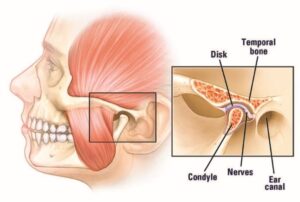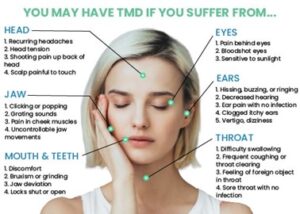Dry Mouth
Dry Mouth Dr. Claire Arcidiacono, ND Most people have had the sensation of a dry mouth in the past. Whether it be because you are thirsty or you have just woken up having that dry feeling in your mouth is not uncommon. However, having a …
Nutrition. Vitamins. You.
How Osteo-Lube™ Supports your Health! Dr. Claire Arcidiacono, ND I wanted to take the time to talk about a product that in my mind just does not get nearly enough attention! This product is called Osteo-Lube™. I bet you are thinking Osteo-Lube™ what the heck …
TMJ
Dr. Claire Arcidiacono, ND
No conversation about oral health would be complete without talking about TMJ disease or temporomandibular joint disorder. In simple terms, this is TMJ pain. While you may have heard people say that they have TMJ pain do you really know what that even means? We’ll let us get into it, shall we?
What is the temporomandibular joint (TMJ)? It is the joint between the lower jawbone (mandible) and the temporal bones of the skull. There is 1 of these joints on each side of your head. These joints work together to allow your jaw to move up/ down, side to side and forward/ backward. When you open your mouth to eat, talk or even just laugh you are using the temporomandibular joint or TMJ to do so. As you can guess, these joints get plenty of use. Please look at the attached picture for a better idea of just where this joint is. (1)

TMJD is more common than you might expect. In fact, it is estimated that anywhere from 10-35 million people in the US are affected by this condition at any time. This is more common in women in fact, for every one man who has TMJ nine women have the disorder! (1)
What are some of the symptoms of TMJ disorders that you may experience? TMJ disorders can cause a clicking or grating sensation when you open your mouth. There may be pain or tenderness of the jaw or even 1 or both of the TMJ joints. You may notice that there is an aching pain in or around your ear. There may be an aching pain in your face. Chewing may be difficult or even painful. In some cases, the joints may lock, making it hard to open or close your mouth. (2) In addition to symptoms in the mouth area or facial area you may notice certain systemic symptoms. There may be pain in the neck area, shoulders, and even chronic headaches. There may be vision changes, dizziness, tinnitus, and a feeling that your bite is “off.” (2) Please see the attached picture for a complete look at the symptoms that can occur. (3)

What are some of the most common risk factors for TMJ disorders? Having arthritis or certain connective tissue disorders can increase your risk. Having an injury to the jaw is also a risk factor. Anyone who grinds or clenches their teeth can damage their TMJ. (1) Certain autoimmune diseases can also trigger TMJ disease. Anything that damages the TMJ can lead to TMJ disease. For example, having an infection in the mouth can lead to joint damage. Certain dental procedures can lead to joint damage. Even having a breathing tube inserted before surgery can overextend the jaw leading to damage. Certain medications can also trigger joint damage and lead to TMJ disease. These medications can include SSRIs, antipsychotics, ADHD meds, Parkinson’s disease meds and even osteoporosis drugs. Studies have found that there may be a hormonal and genetic component to TMJ disease. (2)
So what can you do to help reduce the signs of TMJ disorder?
Our product highlight will be Osteo-Lube!
Sources:

PRIMARY FOOD, LIFESTYLE AND OUR HEALTH~CAREER by: Allie Might, FMC, INHC, ATT Most people do not think about their career and work environment when discussing their personal health and wellness. However, it can be a driving force in managing a healthy lifestyle. I even …
Periodontal Disease and Gingivitis Dr. Claire Arcidiacono, ND Both gingivitis and periodontal disease are conditions in the mouth that involve an overgrowth of pathogenic bacteria. But just how are these 2 conditions related? What are the symptoms you may experience? How do you even develop …
Introduction to Dental Health
Dr. Claire Arcidiacono, ND
Dental health may not seem like a topic that would come up in an Invite health blog series but here we are talking about dental health! Dental health, or in other words oral health, does not just affect the teeth. In fact, there are numerous chronic conditions associated with poor dental health. But why does this connection even exist? And just what chronic diseases are associated with our dental/ oral health?
To start with the mouth is an important opening to our body. In fact, it is the very start of our digestive system! The digestive tract starts in the mouth, where food enters and ends in the anus where waste products exit. In addition to being the entry point for the digestive tract, the mouth is also the entry point to the respiratory tract. But why does this even matter? You may have heard that the human mouth is full of germs, and this is true. Since the mouth is a major opening to the body it also means that any bacteria in the mouth can enter the body either via the digestive tract or respiratory tract.
These bacteria that are in the mouth can lead to different systemic diseases. Let us start with how oral health can affect our heart health. Oral germs can lead to inflammation and even infections. Studies have found a link between inflammation and infections in the mouth and stroke, clogged arteries, and heart disease. Endocarditis is an infection in the heart that occurs when bacteria travel from one part of the body and end up attaching to the heart. One of the places that is common for these bacteria to travel from is the mouth. (1) In fact, people with gum disease are 28% more likely to have a heart attack than those without dental problems. Studies have also found that those who lack access to dental care as teens have an increased risk of high blood pressure later in life. Additionally, studies have found that those with gum disease are three times more likely to have a stroke that can impair vision. (2) In fact, the bacterium in the mouth is the reason the American Heart Association recommends that in high-risk people, an antibiotic be prescribed prior to dental surgery. (3)
Studies have also found that the bacteria in the mouth can travel to the lungs. This can lead to pneumonia and other respiratory conditions. (1) In fact, gum disease can worsen inflammation in lung disorders such as asthma and COPD. (4)
Oral health can also have negative effects on pregnancy. In fact, periodontitis has been found to be linked to both premature birth and low birth weight. (1) Severe periodontal disease in pregnancy can even lead to an increased risk of miscarriage or stillbirth. (5)
Oral health can also impact your daily life. For example, neglected oral health can lead to chronic pain, discomfort and even trouble eating. Oral health can also affect your ability to speak. Chronic dental pain can make it difficult to concentrate, work effectively and even enjoy daily activities. Dental concerns can lead to self-consciousness, low self-esteem, and even social anxiety. (6)
In addition to hygiene practices there are certain systemic health conditions that can negatively affect oral health. These include diabetes, HIV/AIDS, cancer, Alzheimer’s disease, eating disorders, RA and Sjogren’s syndrome. (1) Even certain medications and foods can affect our oral health. In fact, I will be doing a whole blog just on what foods and medications can affect our oral health.
What can you do to improve your dental/ oral health?
Our next topic will be Gingivitis and Periodontal disease.
Sources:
